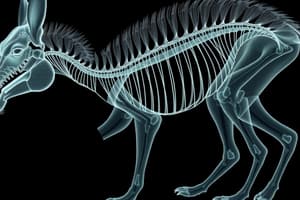Podcast
Questions and Answers
ما هي طريقة تصنيف الحيوانات بناءً على الصفات البدنية؟
ما هي طريقة تصنيف الحيوانات بناءً على الصفات البدنية؟
- تصنيفها بناءً على تركيب جيناتها
- تصنيفها بناءً على وجود العظام في جسمها (correct)
- تصنيفها بناءً على نوع الطعام الذي تأكله
- تصنيفها بناءً على الحركة الطوعية والاستجابة للمحفزات
ما نوع الحيوانات التي تتمتع بالفقار؟
ما نوع الحيوانات التي تتمتع بالفقار؟
- الفقاريات (correct)
- اللافقاريات
- اللاعمودية
- اللاسعافة
ما هو التصنيف الذي يعتمد على دراسة العلاقات التطورية بين الأنواع؟
ما هو التصنيف الذي يعتمد على دراسة العلاقات التطورية بين الأنواع؟
- تصنيف استناداً إلى تاريخ الحيوانات
- تصنيف مورفولوجي (correct)
- تصنيف استناداً إلى موقع الحيوان في الغذاء
- تصنيف في اختبار التحمل
ما هو نوع الحيوانات التي تأكل اللحوم؟
ما هو نوع الحيوانات التي تأكل اللحوم؟
ما هو التصنيف الذي يشمل فقرة؟
ما هو التصنيف الذي يشمل فقرة؟
ما هو عدد الأزواج من الأرجل التي تمتلكها حشرات مثل insects؟
ما هو عدد الأزواج من الأرجل التي تمتلكها حشرات مثل insects؟
ما هو التصنيف الذي يعتبر الأوسع في التصنيف التصنيفي؟
ما هو التصنيف الذي يعتبر الأوسع في التصنيف التصنيفي؟
ما هو التصنيف الذي يأتي بعد الرتبة في التسلسل التصنيفي؟
ما هو التصنيف الذي يأتي بعد الرتبة في التسلسل التصنيفي؟
ما هو التصنيف الذي يختلف بين أنواع الحيوانات المختلفة؟
ما هو التصنيف الذي يختلف بين أنواع الحيوانات المختلفة؟
أي من التصانيف التالية يمثل الحلقة Chordata؟
أي من التصانيف التالية يمثل الحلقة Chordata؟
في أي تصنيف تجد مثلاً لطائر Aves (الطيور)؟
في أي تصنيف تجد مثلاً لطائر Aves (الطيور)؟
ما هو التصنيف الذي يأتي قبل نوع الحيوان في التسلسل التصنيفي؟
ما هو التصنيف الذي يأتي قبل نوع الحيوان في التسلسل التصنيفي؟
Flashcards are hidden until you start studying
Study Notes
Animals
Animals are multicellular, eukaryotic organisms of the kingdom Animalia. They are characterized by their ability to move voluntarily and respond rapidly to stimuli. There are several ways to classify animals based on shared physical traits, behaviors, or evolutionary history. Here are some key aspects of animal classification:
Classification Based on Physical Traits
Physical characteristics such as body structure, presence or absence of limbs, and feeding habits can be used to classify animals into various categories. For example, fish have fins (or in some cases, wings), gills for respiration, and scales covering their skin. Insects, on the other hand, have three pairs of legs and six jointed appendages attached to their thorax. Vertebrates possess a backbone, while invertebrates do not. Herbivores feed mainly on plants, carnivores eat meat, and omnivores consume both plant matter and animal products.
Phylogenetic Classification
Phylogenetics is the study of evolutionary relationships among species. This approach involves analyzing DNA sequences and morphological features to establish the ancestry and descent of different groups of animals. According to this method, all living animals fall under one of five major branches or phyla:
- Protostomia (Including mollusks, arthropods, annelids)
- Echinodermata (Starfish, sea cucumber, sea urchins)
- Chordata (Vertebrates like mammals, reptiles, birds, amphibians, fish)
- Ctenophora (Comb jelly)
- Placozoa (Flatworm with simple structure)
Taxonomic Classification
Taxonomy is another important aspect of animal classification. It is a hierarchical system that categorizes animals based on shared characteristics. The taxonomic hierarchy goes from broadest to most specific as follows:
- Domain: All organisms can be classified into three domains: Bacteria, Archaea, and Eukarya.
- Kingdom: Animals belong to the kingdom Animalia.
- Phylum: Fish are part of the phylum Chordata, while insects are found in the phylum Arthropoda.
- Class: Examples of classes within chordates include Mammalia (mammals) and Aves (birds).
- Order: Within mammal orders, we have Primates (monkeys, humans), Rodentia (rats, squirrels), Lagomorpha (rabbits), etc.
- Family: Dolphinfish belongs to the family Irididae, while tuna falls under the Scombridae family.
- Genus: Under genera, dolphinfish belongs to the genus Coryphaena, while tuna is part of the genus Thunnus.
- Species: Finally, each unique animal is identified by its species name.
Classification helps us understand the diversity of life on Earth and its relationships. By studying these various systems of classification, we gain a deeper understanding of the biological world around us.
Studying That Suits You
Use AI to generate personalized quizzes and flashcards to suit your learning preferences.




